ECO is a project through which the students of the 11 Grade of the Ntra. Sra. Del Carmen School (Maristas, Badajoz) become experts in cultural diffusion.
Through an APP and a WEB, ecomaristasbadajoz.com, the boys and girls of all branches of knowledge spread news of events to be held in the city and that have to do with their interests, especially with those who are Related to the careers they want to study and the contents of the curriculum of 1st Bachillerato. In addition, students attend such events and then write critical reviews in which they value the activity and encourage and advise other partners to participate in it.

GO TO ECOMARISTAS.COM WEB!!

GO TO GOOGLE PLAY AND GET OUR APP!!
The news and reviews are related to the whole content of the subjects of philosophy (Philosophy of science, aesthetics, Political and social philosophy, anthropology ...) and history (Universal and Spanish).
The knowledge and skills learned are then shared and disseminated among their colleagues in the school and especially among their Erasmus + colleagues thanks to a knowledge bank as well as several workshops and a gymkana organized by the students themselves and executed with students from other courses As participants.
The project is born in the classroom and from there extends to all corners of Badajoz: Museums, Faculties, theaters, cinemas, Ateneo, conference rooms ... there is no cultural corner that our students do not reach.
In addition to going abroad, the Project is characterized by an incessant movement of redeployment since the activity of the Knowledge Bank, the workshops and the gymkana, all these activities carried out by the students, seek to reflect on what is learned outside the center And spread it among his peers.
OBJECTIVES:
-Motivate informal learning. -Improve oral and written communication. -Foster critical and relational thinking. -Develop some of the skills of the 21st Century, especially the 4 C's: Collaborate, Critical Thinking, Creativity and Communication. -Learn how to manage projects -Develop the following Digital Competences:
- Information Digital Literacy:
- Navigation, searching and filtering information
- Evaluation of information
- Communication and Collaboration:
- Share information
- Collaboration through digital channels
- Creating digital content:
- Digital Content Development
- Integration and re-elaboration of digital content
- Copyright and licensing
- Problem resolution:
- Innovation and use of technology in a creative way
- Identification of gaps in digital competence
METHODOLOGY:
There are several methodologies that are put into action with the development of the project.
Project-Based Learning is the first and most obvious. Thanks to it, students learn all phases of project generation, practice management, organization, dissemination, evaluation, importance of attending and organizing material and human resources, timing ... are endless skills and Skills that are achieved through the use of this methodology.
Through Expanded Education, students stop seeing learning as something that only occurs in the classroom and begin to identify knowledge with an activity that may well be part of their leisure time and that is at any time and in any place.
- Movement within the classroom: Knowledge is part of the classroom, where the preparation phase and parts of the implementation and dissemination phases are developed. The classroom is seen as the starting point for research, as the place where students can meet and organize what they learn abroad, and as the space where they share their experiences and knowledge.
- Movement out of the classroom: Promoting informal learning through visits to city events is a fundamental part of the project. This also enhances meaningful learning as well as initiative and self-esteem.
- Movement in the classroom: The following external agents will enter the classroom to guide and help the students: Rafael Barragán (PPP designer) to teach them the functioning of the APP, Pedro Merino (local newspaper computer) to explain the importance The respect of the copyright and some keys on security and privacy on the Internet.
Significant Learning: The writing of reviews through which students criticize and relate to curriculum content allows what is learned in class to be of value and significance, and to see different people doing workshops, giving lectures on various topics, Organizing exhibitions ... allows them to give vital importance to everything learned in the events.
Cooperative work: The whole project will be carried out with cooperative learning. During the preparation phase the students will work on base teams, and later these will be defined according to the interests of each student, so that they can visit events jointly attending to what they want and are more motivated to learn. The knowledge bank can also be done in groups or couples, giving the student the freedom to decide how he wants to organize his knowledge and how he wants to present it to the rest.
The workshops and gymkanas are prepared in the same groups in which they have been working during the execution phase (search, publication and visit of events and news).
The application of all these methodologies has a very clear consequence, a new way of understanding education.
PHASES OF PROJECT DEVELOPMENT:
Preparation phase: During this phase students will be introduced to the project, using explanatory videos designed with the Powtoon tool.
Some of the skills that the students will need to develop the project will be worked on later. The activities that will be carried out to achieve the development of these skills and the objectives sought with each one of them are the following:
- Viewing History and Philosophy Movies: The goal is to start using relational thinking so that it can then be applied to news stories and review writing. (From the subjects of philosophy and history)
- Design a logo for the project: Begin to master the use and editing of images. Also to motivate the students in the project. (From the subject of economics)
- Drafting of the project: Improvement of writing and cooperative work. Search of the conjunction of the group.
- Use of Web 2.0 tools for text editing, mental maps (relational thinking) and elaboration of glossaries and reviews: Hackpad and Google drivUse Web 2.0 tools for image editing and content creation. Prezi, Powerpoint and Photoshop.
Execution Phase: Activity 1: Search and post news and reviews
The students will look for news, as well as images with creative commons license, and will publish them in the APP and the WEB showing their interest and relation with the contents of the subjects of philosophy and history of 1º Bachillerato. The news will be disseminated on social networks.
They will attend the events and write critical reviews in which they show the relation with these subjects as well as the possible interest that can have for other young people attending these events. These reviews will be published on the WEB and the APP and will be disseminated on social networks.
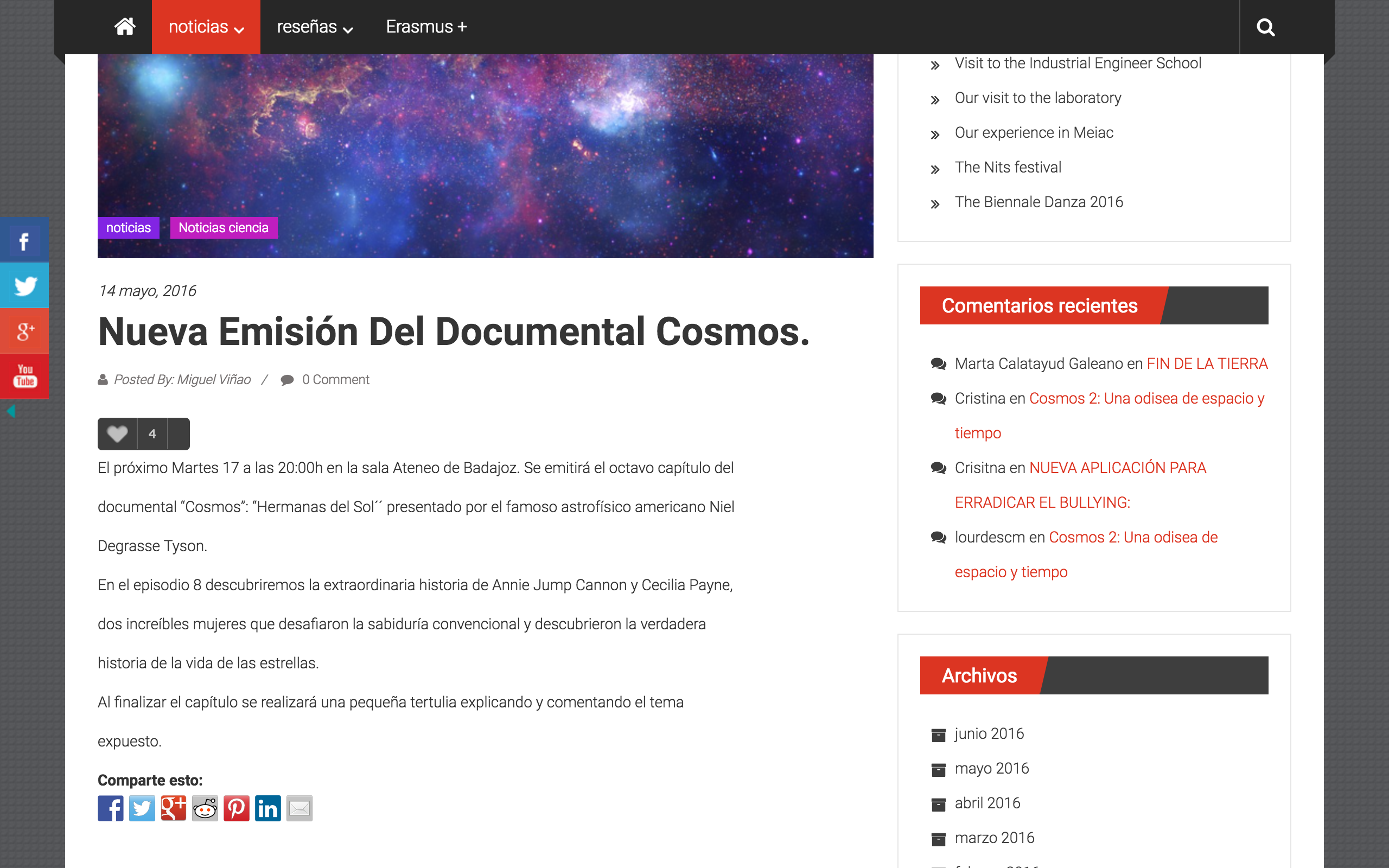
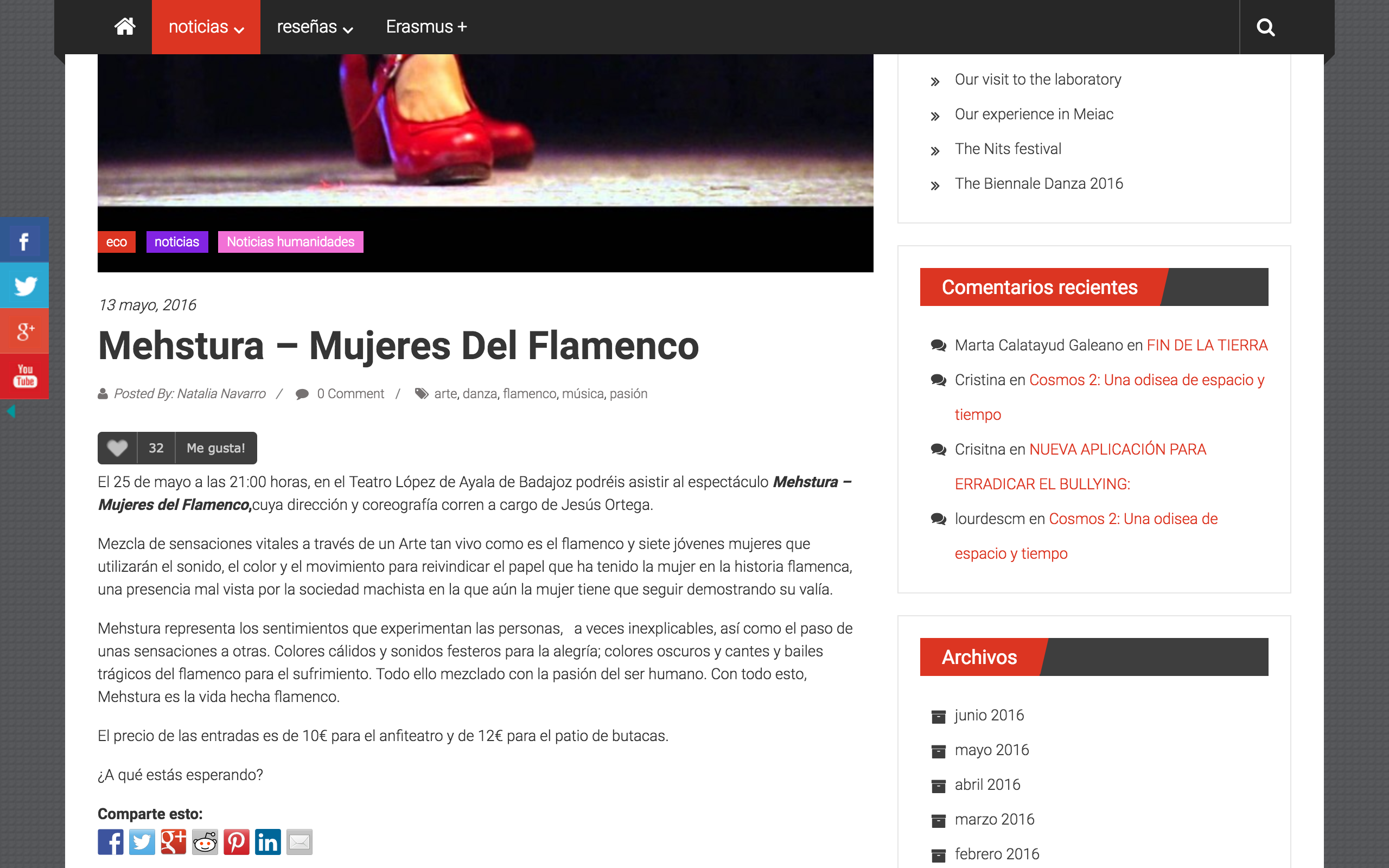


Activity 2: ECO knowledge bank Context and presentation of the ECO Knowledge Bank:
The idea of creating a Knowledge Bank seemed very attractive to us to be able to share everything we learned in such experiences (although not only what was learned in the events, it could be any other knowledge or skill that the student considered interesting and worthy of being offered to the rest ) And be able to enrich the project and expand the results to all students in the classroom.
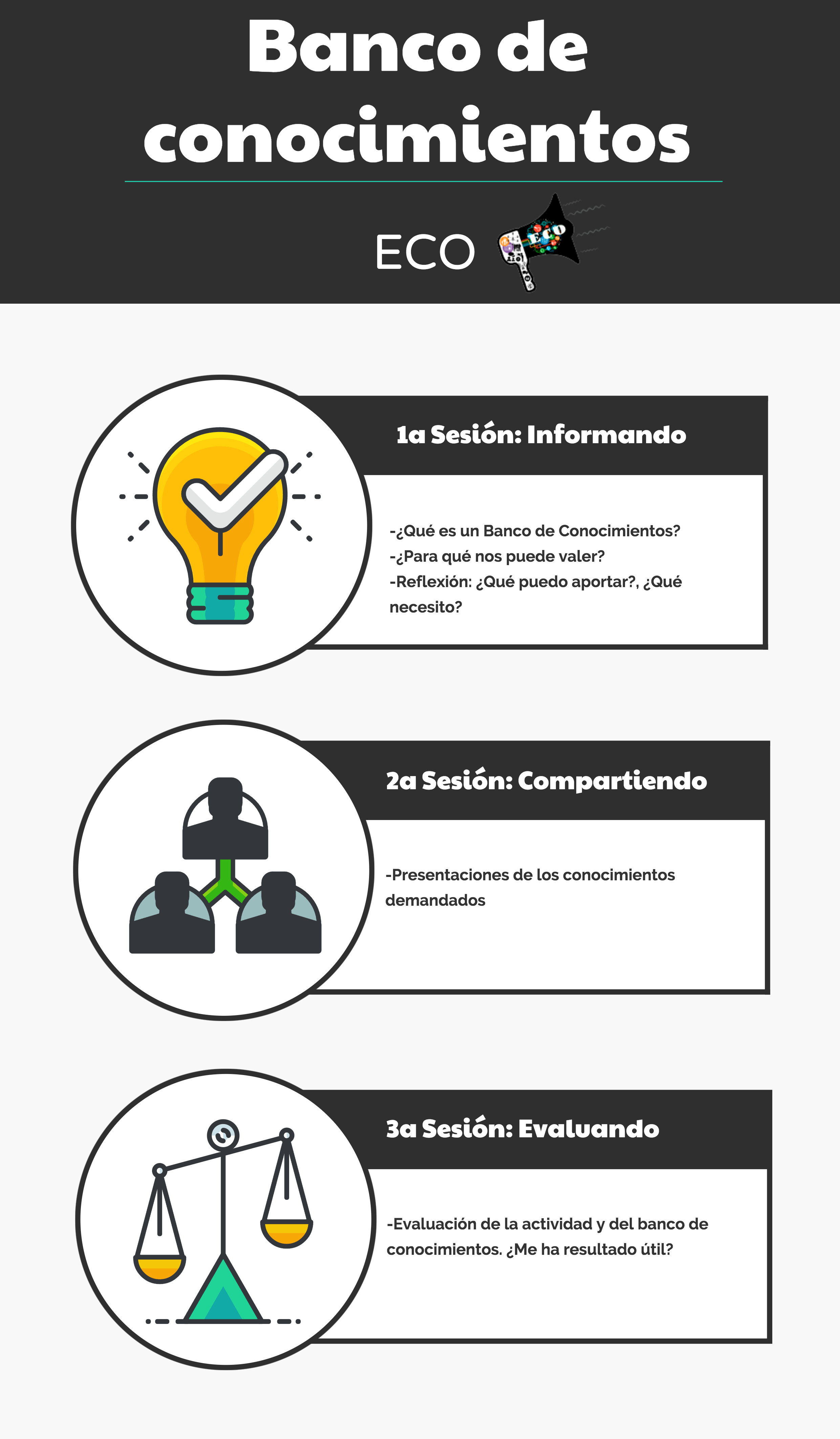
After evaluating the most demanded knowledge, the work was distributed and a date was set for the dissemination and transmission of knowledge.
Thus was the distribution of knowledge pills:
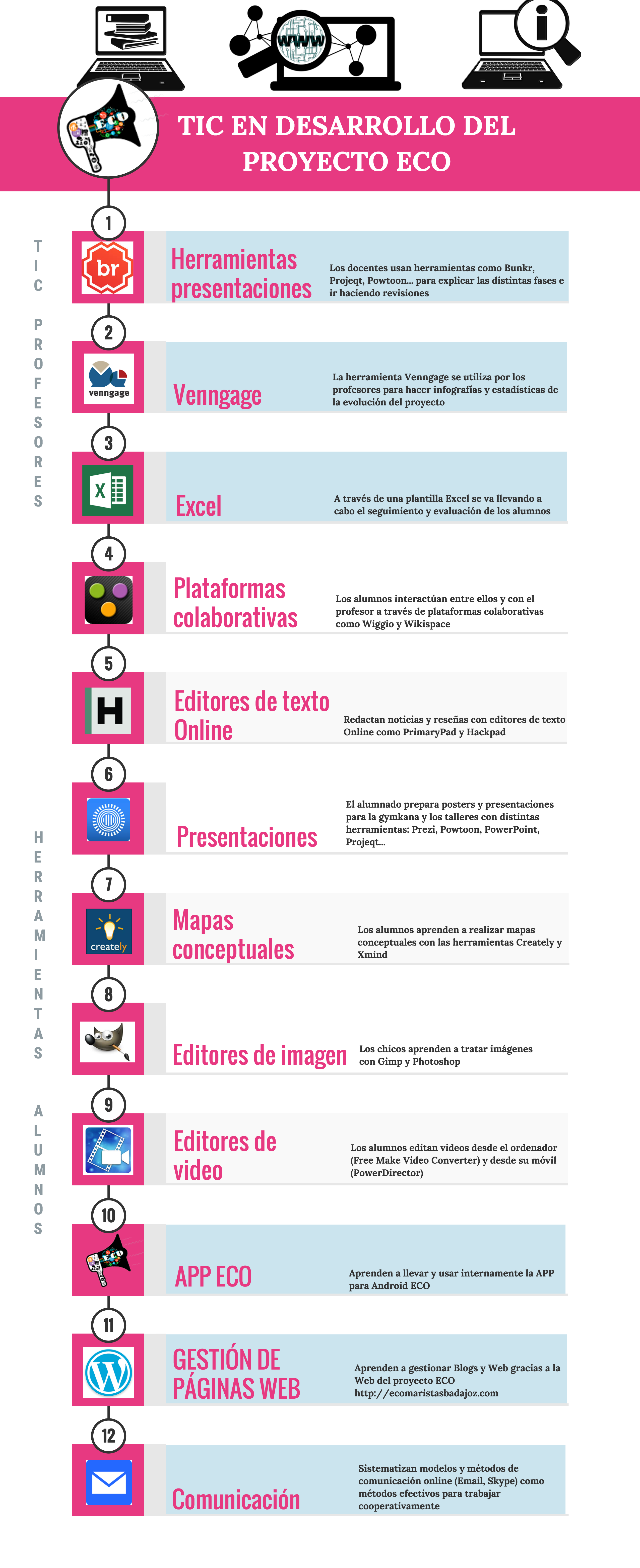
9.3. Dissemination Phase: The ECO workshop was held for Erasmus + students as well as a gymkana about the contents learned in the events and their relationship with philosophy and history.
LINK TO THE ERASMUS + ECO WORKSHOP RESULTS
ICT in the diffusion phase: 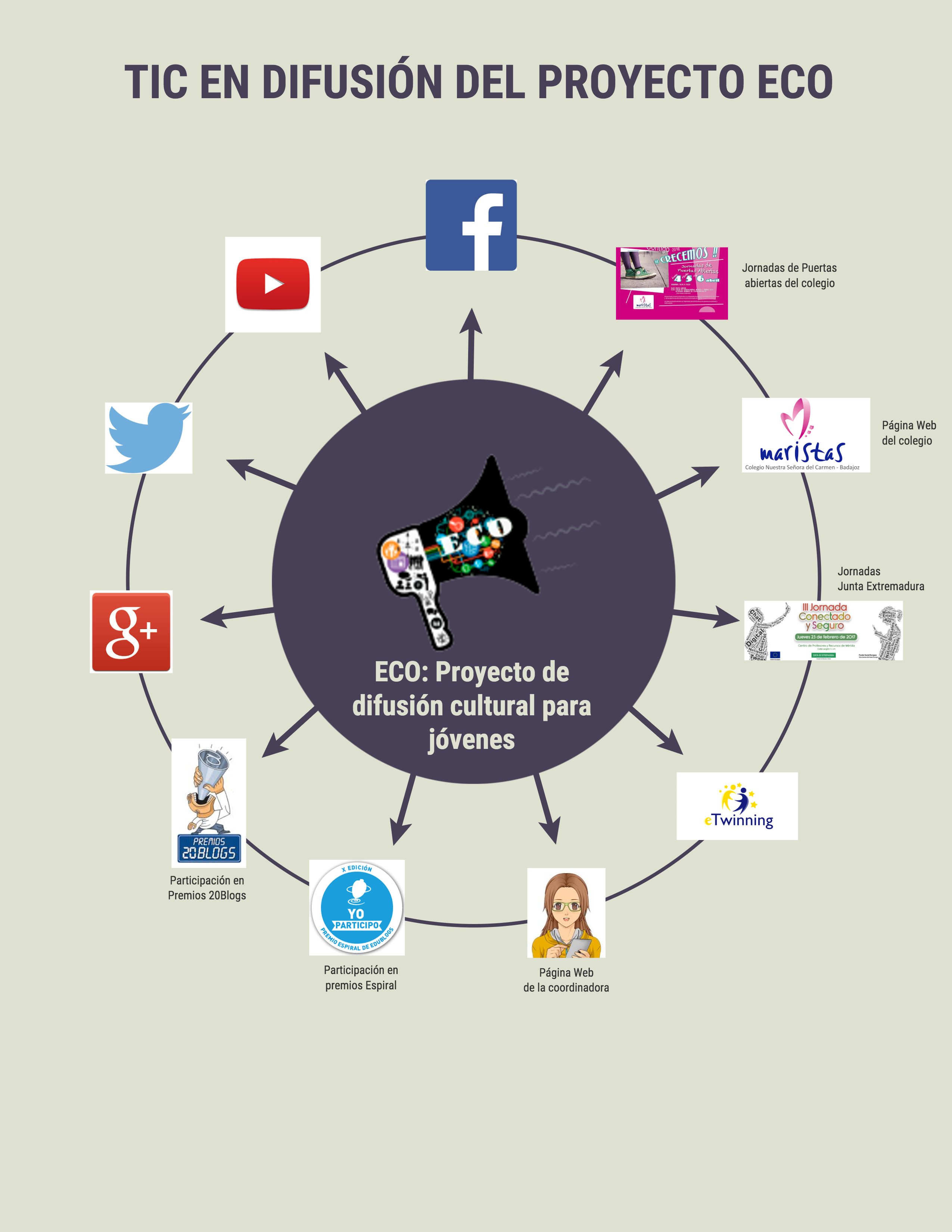
EVALUATION:
The ECO project is evaluated by combining teacher assessment, co-evaluation and self-assessment.
The instruments used to evaluate the project are: Indicator Sheets, Headings, Tracking tabs Online questionnaires. We specify below the type of evaluation and the instruments used for each activity and phase of the project.
PHASE OF EXECUTION: Activity 1: Publication of news and reviews:
The teacher evaluates the quality of the news and reviews published by students using specific rubrics designed for this purpose (HEADING 1 AND 2).
The teacher will also use an Excel to keep track of the news and reviews published by each student throughout the project.
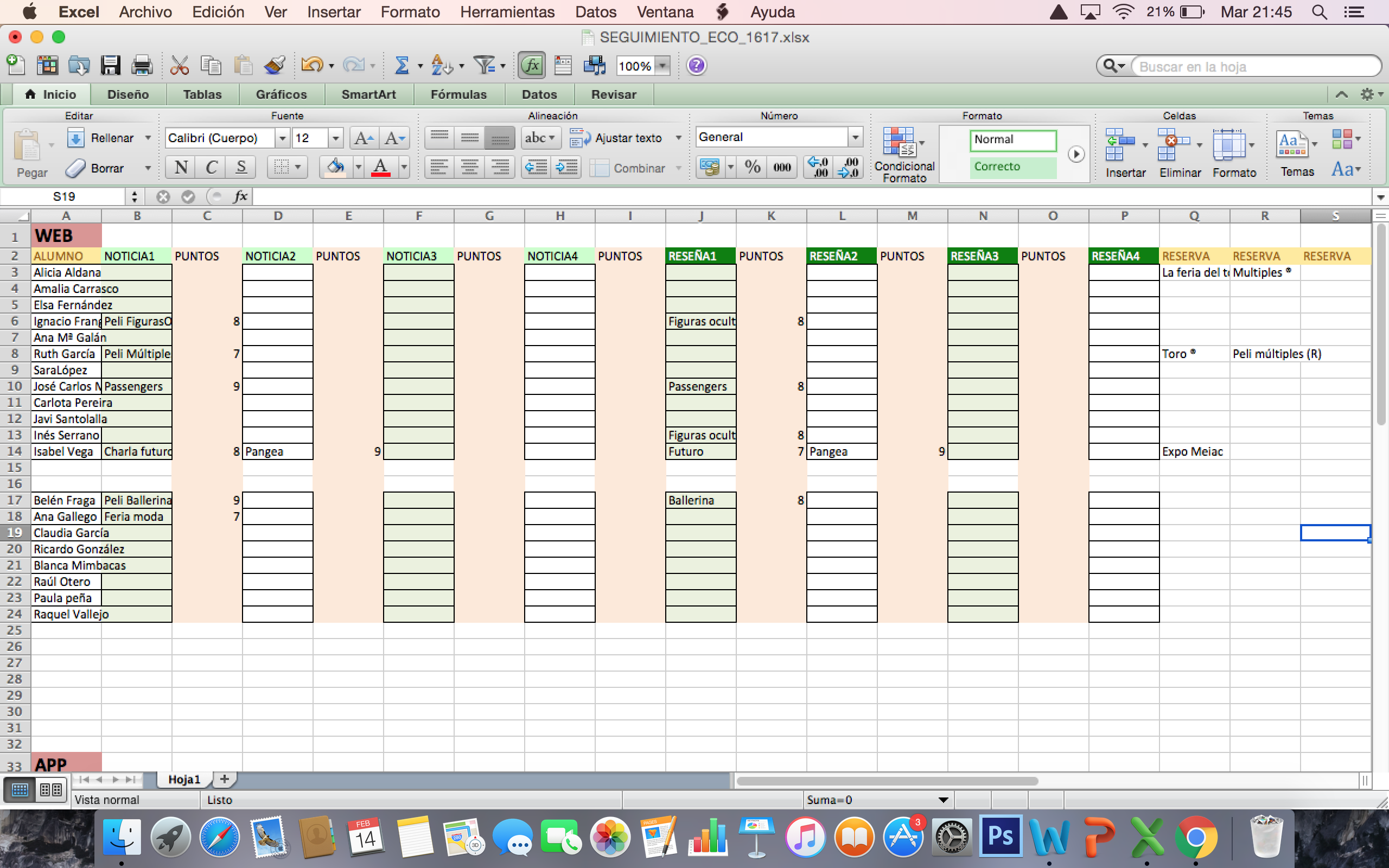
In this Excel we marked the quality of each news and review published by the students on a monthly basis, so that at the end of the project we could be able to evaluate the improvement of skills throughout the project, in particular, the skills that Follow-up will be as follows:
- Written communication (Writing in news and reviews),
- Relational ability (Relationship with curriculum in news and reviews),
- Technological literacy (Image and dissemination in networks in news and reviews),
- Critical thinking (critical thinking in reviews)
The students knew the rubrics from the first day and the teacher shared them with them.
When the teacher observed that the students were not clear about how to write the news and reviews or noted that the boys were not giving everything they could or that they could improve on their results, he or she met them and, rubric in hand, asked them to carry out a self-assessment exercise to raise awareness of the errors they were having and could correct them.
Activity 2: ECO Knowledge bank. This activity was evaluated on the one hand by the classmates who were receiving the knowledge capsules and on the other hand by the teacher. For this the following indicators were followed.
DISSEMINATION PHASE:
The Gymkana and the workshops were evaluated by the Erasmus + participants in the workshops and the Gymkana in accordance with Heading 3.
Finally, at the end of the project, a self-evaluation of the students (Spanish and Erasmus + students) was carried out, in which they evaluated the different phases of the project as well as their perception of the improvement of each one of the skills that have been tried to promote during the months that the ECO project has lasted.
An online questionnaire designed with the Kwik surveys tool that was shared with the students was used.
- ÁNGEL MUÑOZ: History teacher. He extended the project to the subject of history. Participates in all phases of the project.
- JUAN GARCÍA: Economics teacher. It participates in the preparation phase coordinating the creation of the logo and teaching the students to design projects and to understand their different phases.
- LOURDES CARDENAL: Philosophy teacher. He extended the project to the subject of philosophy. Participates in all phases of the project.
- RAFAEL BARRAGÁN: Design of the APP. In the preparation phase will give a tutor to the students on how to use this APP.
- ADIL TUGYAN: Coordinator of the Erasmus + project in Turkey. Assistance during the stay of the students in Spain and in their participation in the workshop and gymkana ECO.
- PEDRO MERINO: Collaborator in the project. It teaches students to search for creative commons images and explains the various existing licenses as well as the importance of respecting copyright. Assistant in preparation of materials and aesthetics during all phases of the project.
Contextualización y presentación del Banco de conocimientos ECO: El Banco de Conocimientos ECO es una comunidad creada para el MOOC
#EduExpandida. Los alumnos de 1º Bachillerato del Colegio Ntra. Sra. del Carmen estaban ya realizando un proyecto (
Proyecto ECO) a través del cual, mediante la asistencia a eventos de carácter cultural y científico-tecnológico, relacionados con los currículos de historia y filosofía (exposiciones, charlas, talleres, obras de teatro, ferias...) se convertían en expertos en difusión cultural. Utilizando y gestionando ellos mismos una
APP y una
WEB debían publicar noticias relacionadas con tales eventos así como asistir a estos y redactar reseñas en las que hicieran una crítica de lo experimentado y recomendasen (o no) la asistencia de otros jóvenes a tales actividades. La idea de crear un
Banco de conocimientos nos pareció sumamente atractiva para poder compartir todo lo aprendido en tales experiencias (aunque no sólo lo aprendido en los eventos, podía ser cualquier otro conocimiento o destreza que el alumno considerase interesante y digna de ser ofrecida al resto) y poder así enriquecer el proyecto y expandir los resultados a todos los alumnos del aula. Lamentablemente, el otro profesor que forma parte del proyecto está enfermo y, aunque apoya totalmente la idea del banco de conocimientos,no ha podido formar parte activa de esta fantástica experiencia, al menos, no de esta primera parte, ya que nos ha parecido tan interesante que continuaremos haciendo sesiones del banco de conocimientos durante todo el curso escolar.
Organización y fases del banco de Conocimientos ECO Para crear y poner en marcha nuestra banco de conocimientos ha sido necesaria 1 sesión en cada uno de los grupos de 1º Bachillerato. En esta
1ª sesión se presentó el Banco de conocimientos a los alumnos. Para ello se usó un video de motivación y se acompañó de las explicaciones pertinentes de las profesora así como de una pequeña infografía que les permitía ver el esquema de la actividad. https://www.youtube.com/watch?v=gxRI8UOPPVw

[gallery ids="1484,1485,1487" type="rectangular"]
Alumnos de 1º Bachillerato preparando ofertas y demandas de conocimientos
[wpvideo xt0Yo3JA]
Video preparado y editado por la alumna Ruth García-Tenorio
[gallery ids="1513,1514,1515,1516,1517" type="rectangular"]
Alumnos de 1º B durante la 1ª sesión del Banco de conocimientos ECO
Tras esta introducción comenzamos a trabajar. El siguiente paso fue reflexionar acerca de qué podía ofrecer cada uno (podía hacerse de manera individual, en parejas o en grupo) y qué demandas tenían de conocimientos. La puesta en común se llevo a cabo con la herramienta PADLET: https://padlet.com/lourdescm/Banco
Padlet de 1º Bachillerato A
https://padlet.com/lourdescm/bancoB
Padlet 1º Bachillerato B
Tras evaluar cuáles eran los conocimientos más demandados, se repartió el trabajo y se marcó una fecha para realizar la difusión y transmisión de conocimientos. Así quedó el reparto de píldoras de conocimiento para las dos primeras sesiones de nuestro Banco de conocimientos ECO para las clases de 1º Bachillerato A y B: [slideshare id=71733875&doc=pildoras1aok-170203173143&type=d] [slideshare id=71733976&doc=pildoras1bok-170203173440&type=d]
En la
2ª y 3ª sesión se llevaron a cabo las presentaciones de los contenidos demandados por el alumnado. Dejamos aquí las cápsulas de conocimiento llevadas a cabo, no sin antes agradecerle a los alumnos participantes su interés y esfuerzo:
1º BACHILLERATO A https://www.youtube.com/watch?v=qtTmmJo4Fo0 https://www.youtube.com/watch?v=SPcvnGFI2os https://www.youtube.com/watch?v=52CxJo1UVhk https://www.youtube.com/watch?v=vG2AJMCfONI [slideshare id=71948514&doc=filosofia-170209075815] https://www.youtube.com/watch?v=sH41OB8xYBs Cápsula sobre cómo redactar bien: [slideshare id=71948427&doc=pildoraredaccion-170209075503] Cápsula sobre la felicidad: [slideshare id=71971056&doc=presentacion2-170209173353]
1º BACHILLERATO B
https://www.youtube.com/watch?v=4FvFSjsDgSE
https://www.youtube.com/watch?v=i6gSR0mviUY https://www.youtube.com/watch?v=Q6rQJtwccHU https://www.youtube.com/watch?v=XChtCXdL9pE